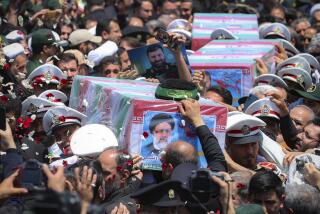A year later at U.N., Iran’s president has much-tougher task
The smile is still there, along with the optimistic patter, but Iranian President Hassan Rouhani is struggling with a much tougher task this week as he tries to duplicate last year’s successful charm offensive at the United Nations General Assembly.
Rouhani, widely seen as a moderate, wants to show the world that the Islamic Republic is open to better relations with the West and will accept fair terms in the ongoing negotiations over Iran’s disputed nuclear program.
Yet it’s a hard sell because his boss and the country’s supreme leader, Ayatollah Ali Khamenei, has made it clear in a series of thundering pronouncements that he is prepared to give no ground on the nuclear program, and that he believes dealing with the U.S. is fruitless.
In a series of appearances this week, Rouhani has been trying to square that circle. He denounced the United States and the West at one moment and, the next, insisted that the two sides can have other fruitful collaborations if their nuclear negotiations succeed.
He mocked the United States as weak for its unwillingness to deploy combat troops, instead dispatching drones and bombers on what he characterized as a futile mission to wipe out the militant group Islamic State.
“If they want to use planes and unmanned planes so that nobody is hurt from the [American side], is it really possible to fight terrorism without any hardship, without any sacrifice?” he asked at one appearance.
During a CBS News interview, he questioned whether Americans are interested in “theater for public consumption, or are they after a tangible, real objective?” Iran, he said, is better suited to take a leadership role in this regional battle because “the victorious one is the one who is ready to sacrifice.”
And as Khamenei has done previously, Rouhani accused the United States of creating the militant group in its efforts to unseat Syrian President Bashar Assad, an Iranian ally.
Yet Rouhani also insisted that he is open to exploring cooperation with the U.S. and Western allies in a number of areas if the two sides can compromise on the gridlocked nuclear issue.
“We need a long-term agreement,” he said Wednesday in an appearance sponsored by the New America Foundation in Manhattan. “We can create a positive atmosphere.”
Rouhani said that he and President Obama had “a great deal of mutual understanding” on how to fight terrorism.
In a different meeting, he said Iran could work with the United States to support Afghanistan’s fragile government, provided the U.S. didn’t move its troops in the country close to Iran’s border, according to one participant.
Rouhani wants to show the world that Iran is willing to be flexible on the terms of the nuclear deal. That way, if the ongoing nuclear negotiations break down, Iran can argue that it was the West’s fault.
But Khamenei has taken an increasingly unyielding line in the negotiations and wants to make it clear that Iran is not dealing from a position of weakness.
In addition, Rouhani is under pressure from conservatives in Iran, who have gained political strength in recent months. They are demanding that he show no sign of acquiescence at this year’s U.N. session.
So Rouhani has not tweeted a Rosh Hashana greeting to American Jews, as he did last year. And he said Wednesday that there could be no repeat of the phone call he had a year ago with Obama, the first contact between U.S. and Iranian leaders in more than three decades.
“The conditions do not dictate such a meeting,” he said Wednesday on CBS. Senior advisors to Obama also downplayed the idea that the president might have any contact with his Iranian counterpart while at the United Nations.
Rouhani has also said that if the nuclear talks break down before their Nov. 24 deadline, that doesn’t necessarily mean an end to the effort. And while Rouhani closed the door on a meeting with Obama, he was willing to meet Wednesday in a one-on-one with British Prime Minister David Cameron.
Rouhani insisted this week that Iran’s deep rift with rival Saudi Arabia — one of the central conflicts in the region — can be overcome.
The countries are moving “closer and closer,” he said at a meeting with senior editors of American news organizations. “I believe our relations need to be warmer.”
Times staff writer Christi Parsons in Washington contributed to this report.
Follow Paul Richter on Twitter: @richtpau
More to Read
Sign up for Essential California
The most important California stories and recommendations in your inbox every morning.
You may occasionally receive promotional content from the Los Angeles Times.











